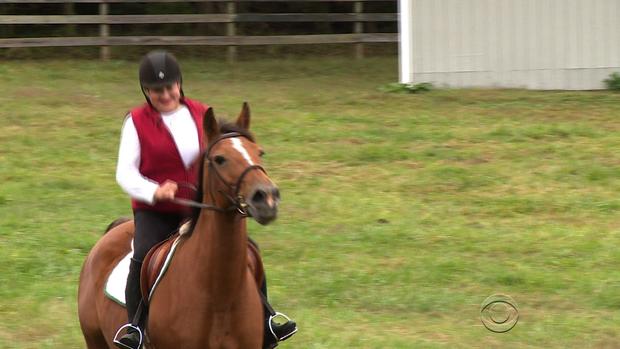New treatment offers hope for headache sufferers
(CBS News) BAHAMA, N.C. - Horses are a big part of Alice Jowers' life. But because of her chronic, debilitating migraine headaches, Jowers cannot find peace caring for her beloved animals.
When a headache hits, the pain is agonizing.
"It is stabbing, searing - as if someone takes a hot poker and just sticks it right through your temple and into your eye," she said.
The 60-year-old is one of 45 million Americans who suffer from chronic headaches. For many headache sufferers, medication, injections and even psychotherapies simply aren't effective.
Now, science may have a new way to help these people. In a small but long-term study, researchers say they have had real success with a device implanted in patients' heads.
Desperation drove Jowers to become one of 46 patients taking part in the long-term electronic pulse study. Two years ago, surgeons implanted a device on her skull under the skin. When she feels the symptoms of a headache coming on, she activates a trigger using a magnet on a small control box implanted in her lower back. That sends an electric pulse along wires to a specific nerve in her brain.
There are short-term medical uses for this technology already available, but this is the first promising long-term migraine treatment of its kind. The electric stimulation of the nerve reduced average headache intensity by more than 70 percent, researchers say.
Lead researcher Dr. Billy Huh says the results have been life-changing for some of his patients.
"The most important thing, they were able to have a family, enjoy life basically without suffering from this debilitating disease," said Huh, who is medical director of the Department of Pain Medicine at The University of Texas MD Anderson Cancer Center in Houston and adjunct professor of the Department of Anesthesiology at Duke University Medical Center in Durham, N.C.
"This treatment offers hope to those patients and a chance," Huh said.
Researchers have found that t treatment doesn't work for everyone, and there can be complications. The device can cause infection and in some cases its electrodes can move around the skull.
But Jowers doesn't care. For her, any relief is an improvement.
"It hasn't been the magic bullet," she said. "But it's helped."
For more information on the research into chronic headache treatments, visit the American Society of Anesthesiologists.
